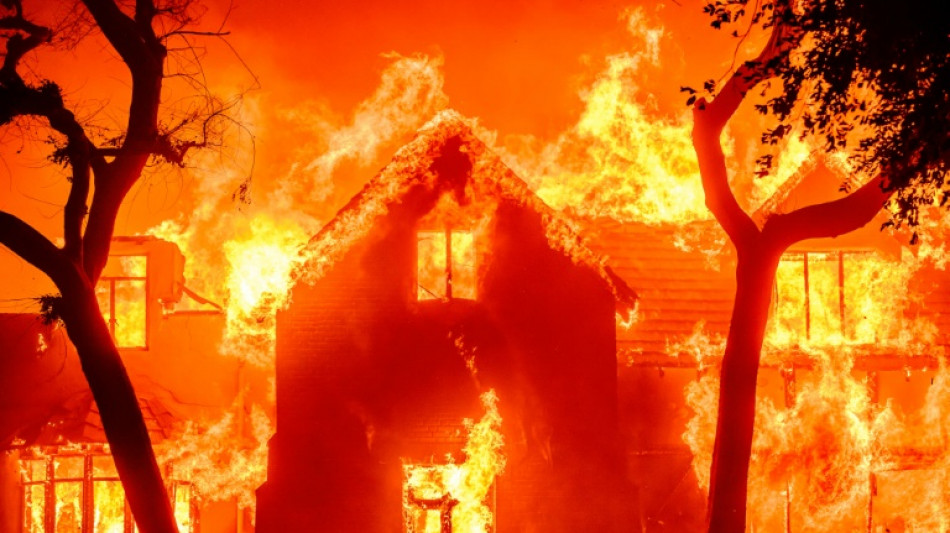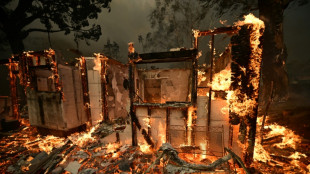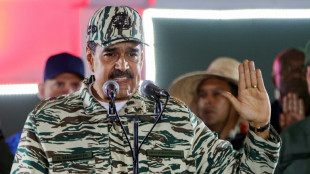

Whole streets burn as fires rage around Los Angeles
Rampaging wildfires around Los Angeles have killed at least two people, officials said Wednesday as terrifying blazes leveled whole streets, torching cars and houses in minutes.
More than 1,000 buildings have burned in multiple wildfires that have erupted around America's second biggest city, forcing tens of thousands of people from their homes.
Hurricane-force winds whipped up fireballs that leapt from house to house in the upmarket Pacific Palisades area, incinerating a swathe of California's most desirable real estate favored by Hollywood celebrities.
"We have no percentage of containment. We have an estimated 1,000 structures destroyed... and a high number of significant injuries to residents who did not evacuate," Los Angeles County Fire Chief Anthony Marrone told reporters of a blaze that has consumed 11,000 acres (4,500 hectares).
A second major fire was burning around Altadena, north of the city, where footage showed flames consumed suburban streets in a fire that has already burnt through 10,000 acres.
"We have over 500 personnel assigned, and unfortunately, we have two reported fatalities to civilians, unknown cause at this time. And we do have a number of significant injuries. We have over 100 structures destroyed," Marrone said.
- Hydrants run dry -
Two other blazes in the area were also stretching resources.
Vicious gusts pushed the flames, whipping red-hot embers hundreds of meters (yards), sparking new spot fires faster than firefighters could quell them.
A pall of dark smoke hung over Los Angeles, like an enormous storm cloud.
Downed trees and broken branches were hampering movement, with emergency chiefs urging residents to stay off the roads to ease the strain on the city's creaking infrastructure.
Los Angeles Department of Water and Power chief executive Janisse Quinones pleaded with people to save water, after hydrants in Pacific Palisades ran dry overnight.
She said three million-gallon tanks used to supply the neighborhood's more than 20,000 residents were exhausted by 3:00 am Wednesday.
"I need our customers to really conserve water... because the fire department needs the water to fight the fires," Quinones said.
"We're fighting a wildfire with urban water systems, and that is really challenging."
Incoming president Donald Trump took to his social media platform on Wednesday to claim -- wrongly -- that the lack of water was the result of the state's environmental policies.
Echoing fantastical claims he made in his first White House term, Trump said rainwater was being diverted "to protect an essentially worthless fish."
In fact, much of Los Angeles' water comes from the Colorado River, and farming -- rather than residential use or firefighting -- takes the lion's share of all water that flows into Southern California.
- 'Panic mode' -
The first wildfire erupted on Tuesday morning and spread quickly, taking many residents by surprise.
It was still spreading on Wednesday, forcing more people from their homes.
Martin Sansing, 54, told AFP he had lived in Santa Monica canyon for 20 years and had never seen anything like this.
"We're in a pretty urban area. We're not like, on a hill or anything like that. I never imagined we would be affected," he said.
"I grew up in Los Angeles, and Malibu used to burn every 10 or 15 years, but not this area."
Sarahlee Stevens-Shippen, 69, spent the night at a friend's house and returned to the canyon early morning to grab a few supplies.
"When I saw the glow of the fire coming over the mountain yesterday about eight o'clock, I took off. It had already jumped the coast highway nearby and some palm trees were catching on fire," she said.
"You got the ashes to worry about in your lungs. You got your life to worry about with these 80 to 100 mile an hour gusts. We've just been in panic mode."
Trees and vegetation around the Getty Villa were burned, but the structure and collections -- including Greek and Roman antiquities -- were spared, the museum said.
The fire came as the area was being hit by seasonal Santa Ana winds that forecasters said could develop into the worst windstorm in a decade, with gusts of up to 100 miles (160 kilometers) an hour.
Wildfires are part of life in the US West and play a vital role in nature.
But scientists say human-caused climate change is altering weather patterns.
Southern California had two decades of drought that were followed by two exceptionally wet years, which sparked furious vegetative growth -- leaving the region packed with fuel and primed to burn.
姜-A.Jiāng--THT-士蔑報


